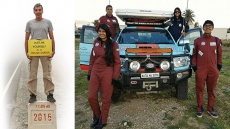Mohammed Rezwan created floating schools in Bangladesh’s flood prone districts to combat school dropout rates and facilitate communities with health and agricultural services.
When Mohammed Rezwan completed his architecture degree, he knew he was one of the few fortunate ones from Bangladesh’s flood prone districts to have achieved a milestone. For families living in Bangladesh’s riverside communities, the arrival of monsoon can wreck lives severely, sometimes for a lifetime. Not only are residents exposed to life-threatening situations but are also ripped off of fundamental necessities such as health
care, security, food, and education.
Rezwan gives us a glimpse of the situation by sharing his own experience as a child. “All roads went under water. It becomes very difficult for children to go to school and many of my relatives and friends could not attend school at that time.” Rezwan’s solar-powered floating school, launched in 2002, aims to resolve struggles of flood-prone communities by bringing education, healthcare clinics, agriculture, and training centres directly to their homes.
This award-winning module has been replicated in more than eight countries through the United Nations and this includes India, Pakistan, Nepal, Philippines and Zambia. “There is a lot of potential with these kind of activities,” points out Rezwan, who grew up in a riverside community exposed to frequent floods. Because his family owned a boat,
Rezwan was able to sustain his education, but the privileges were not accessible to all families and this deeply disturbed Rezwan. “I always had the idea of a floating community but I did not find anyone to invest on the ideas. I started working on my own.” Rezwan had $500 USD from his scholarship and other savings and he used that to establish a non-profit, Shidhulai Swanirvar Sangstha (SSS) in 1998.

Initially, the school was run on local boats but that didn’t seem feasible, so Rezwan designed a specialized plan and gave it to local boat builders. The organization now runs 22 boat schools across three rivers, reaching out to 2,000 students in four districts. Rezwan ensures involvement of the local community to sustain the solar-powered boats’ efficiency. This is done by building boats locally, and training community members in the upkeep of solar panels. “The people who are working here are from the local community and we have more than 200 full-time and part-time staff and more than 300 volunteers who are involved in different types of activities,” states Rezwan.

The infrastructure of floating schools is similar to a regular school – boats are equipped with tables, chairs, black board and multimedia gear. A central library housing over 50,000 books and more than 100 computers provide training material for not only students but also adults. Classes are held until Grade 4, after which students are required to enroll in a public school. Students who excel in their exams are awarded solar lanterns as scholarships, and this is a huge bonus because a majority of students live in houses without electricity. “We thought of introducing solar system on the boat and when we did that we found surplus energy on the boat. I thought of sharing the surplus energy with the community,” explains the 2012 WISE Award recipient.

For Rezwan’s organization, social responsibility anchors as a major thrust and he addresses this in multiple ways. To boost agricultural activities in the region, the school holds classes on sustainable farming techniques in the boat; floating clinics accommodate onboard medical checkups and provide free nutritional supplements to all patients; climate change, like other elements, is also given a holistic approach, for example, an alphabet book written by Rezwan, associates environmental issues with each alphabet to explain environmental challenges to children.

According to a 2015 analysis by World Resources Institute (WRI), over 50 per cent of the world’s population that is exposed to floods lives in five nations in South Asia, and Bangladesh is one of them. The approach and flexibility of the floating school makes it an ideal solution for communities in these regions. “We have a plan to scale up. Right now we are working in three districts in north western Bangladesh. We are working and looking for resources to scale up to people in southern Bangladesh and other flood affected communities.”
To learn more about Rezwan’s initiative and support his cause, visit Shidhulai Swanirvar Sangstha online.










